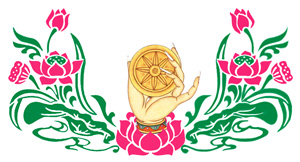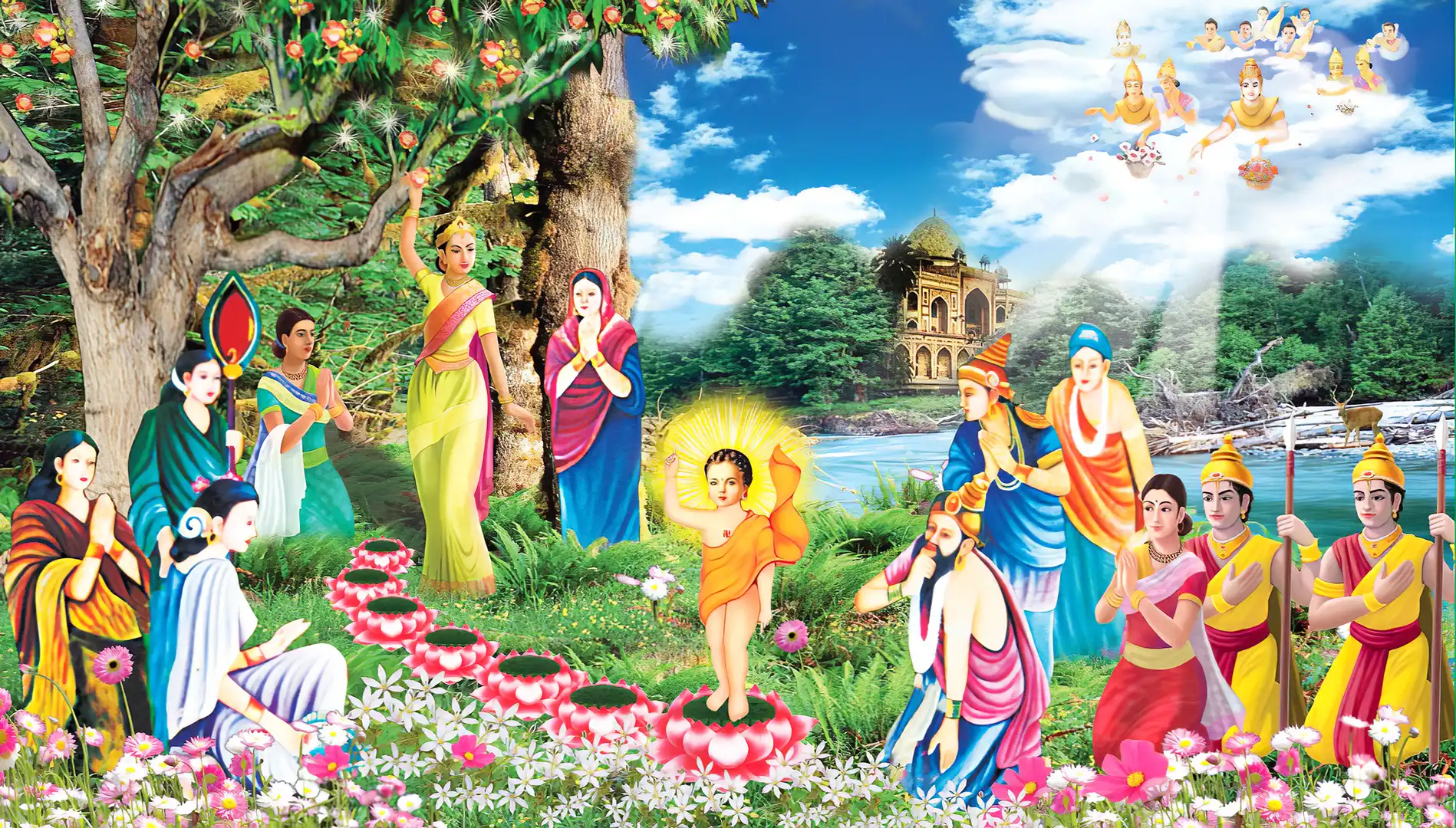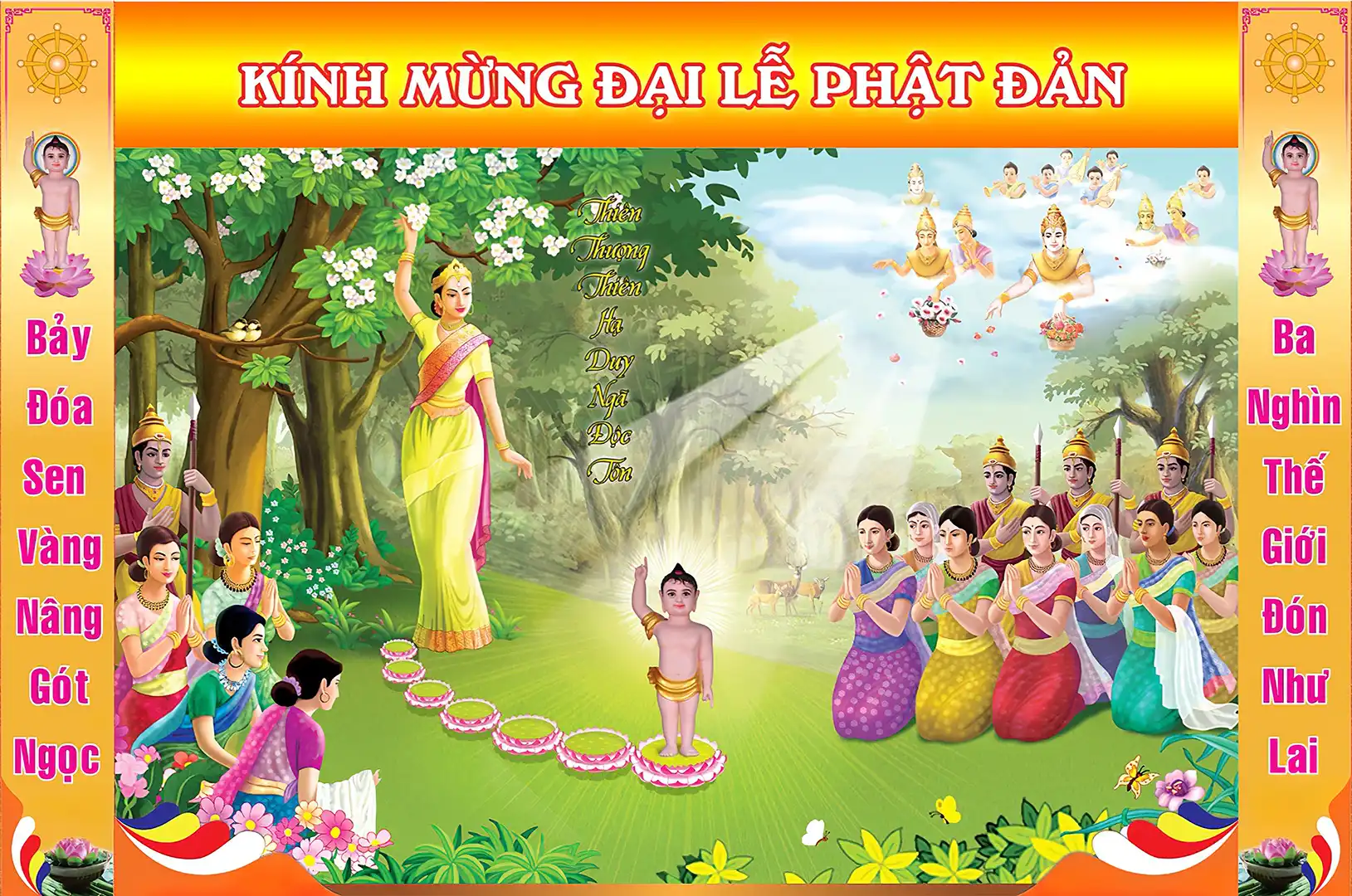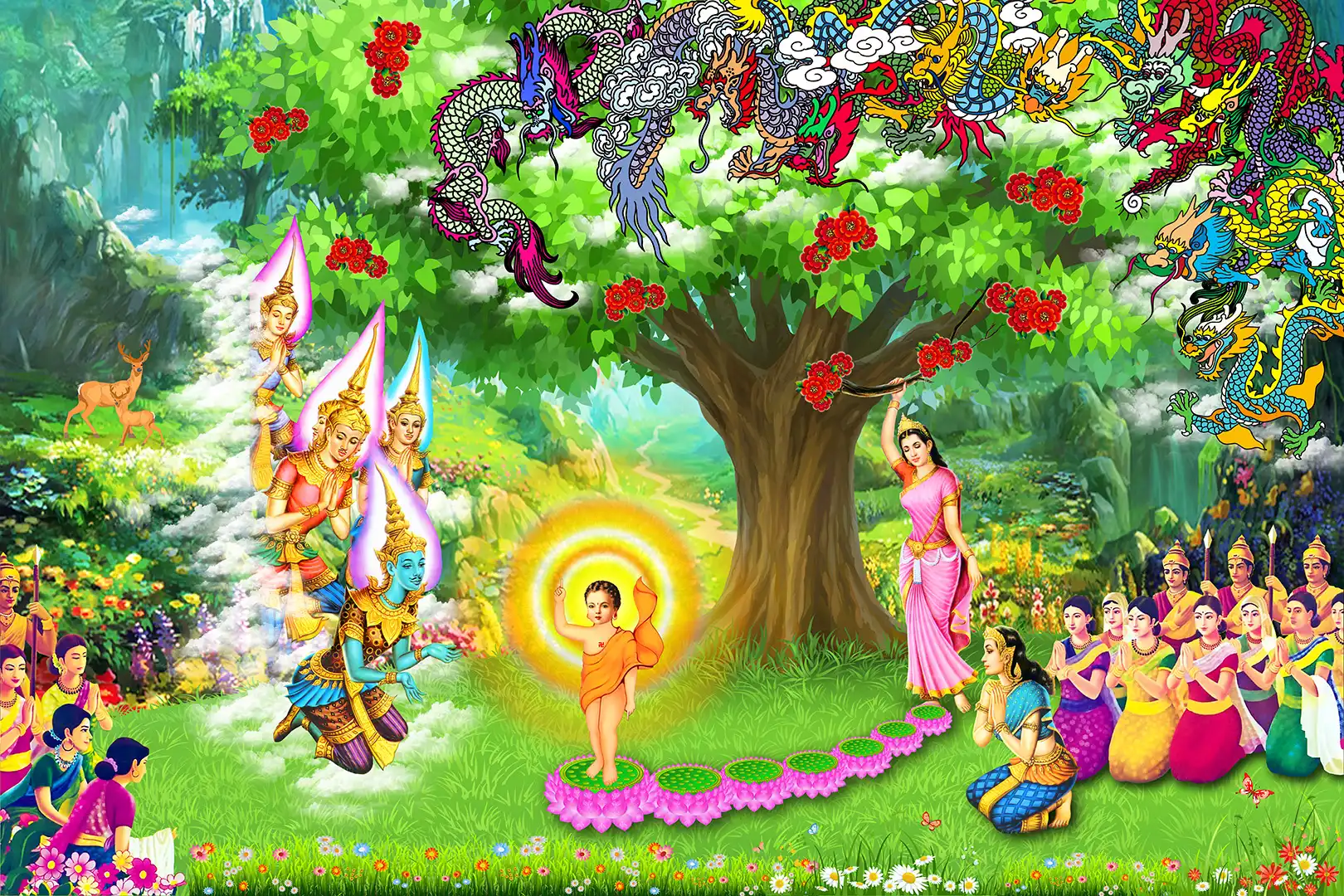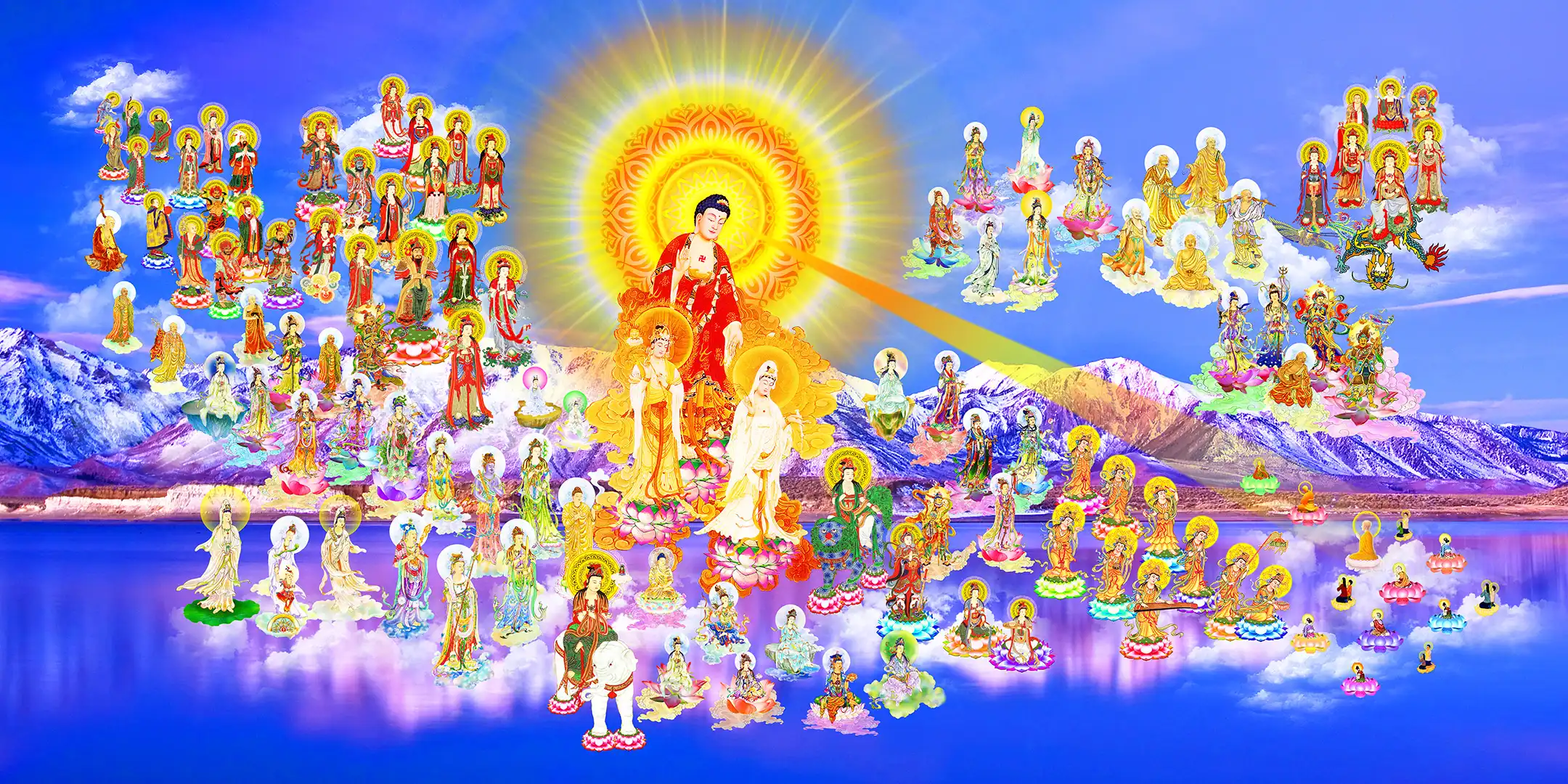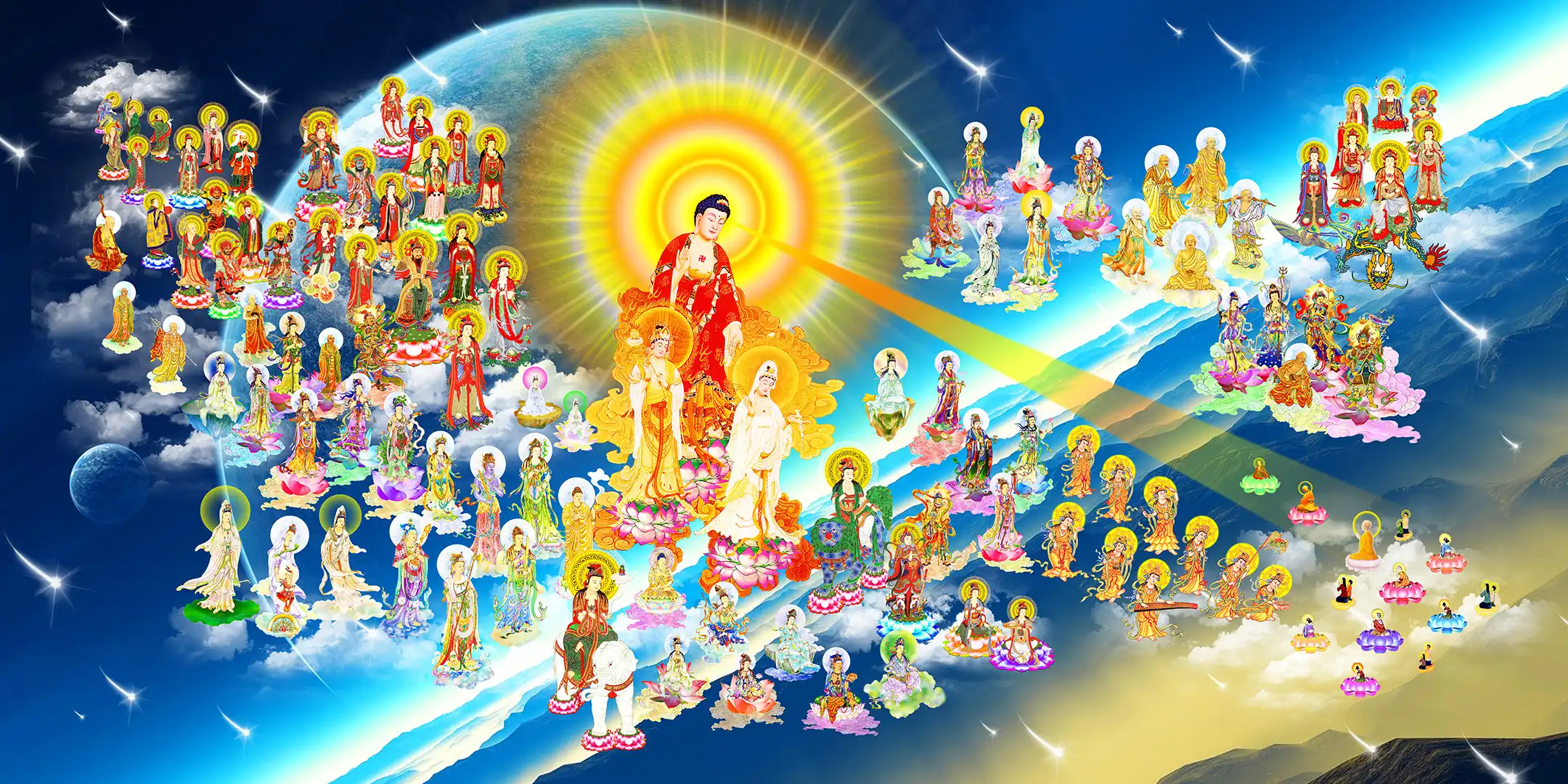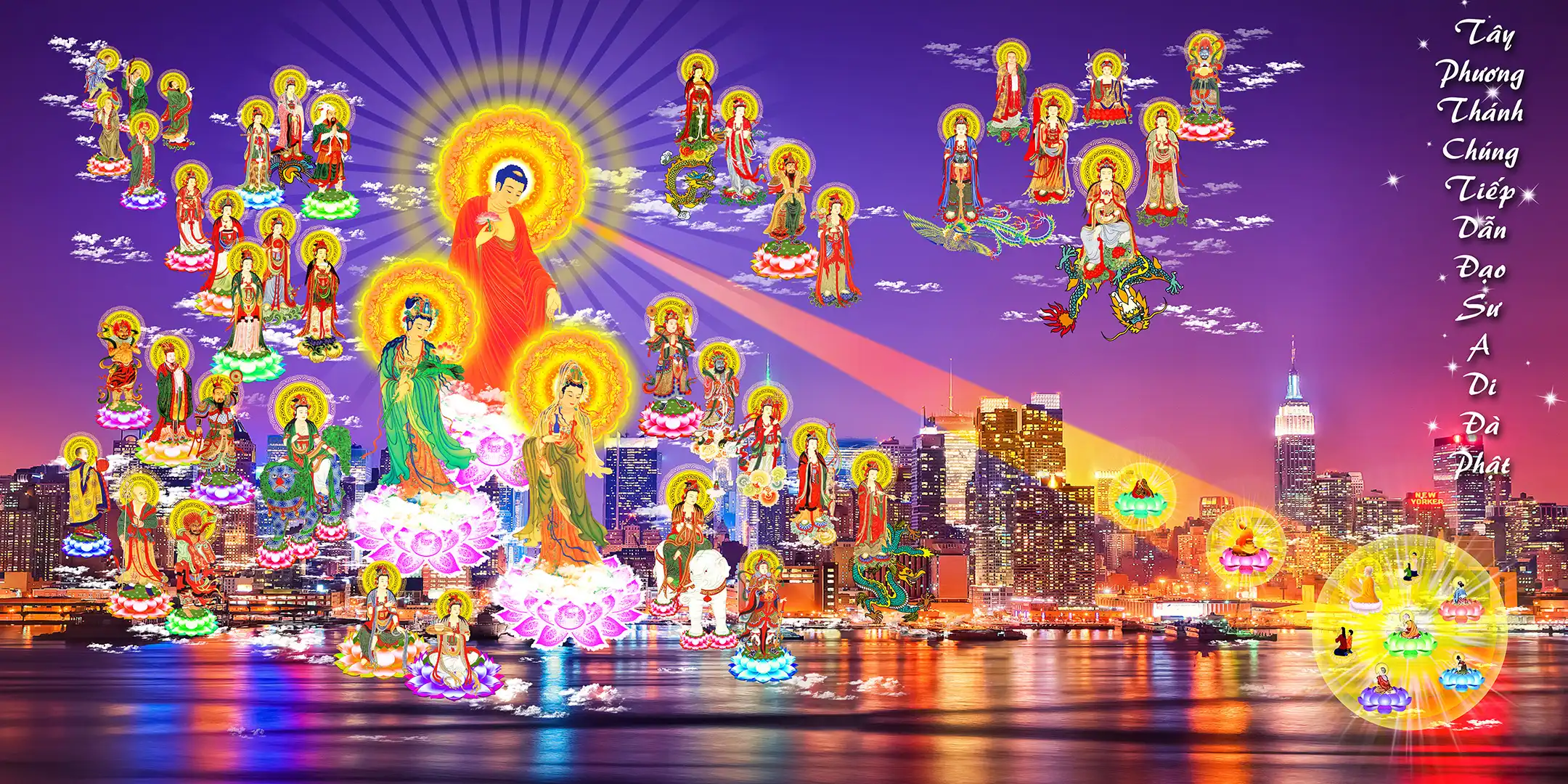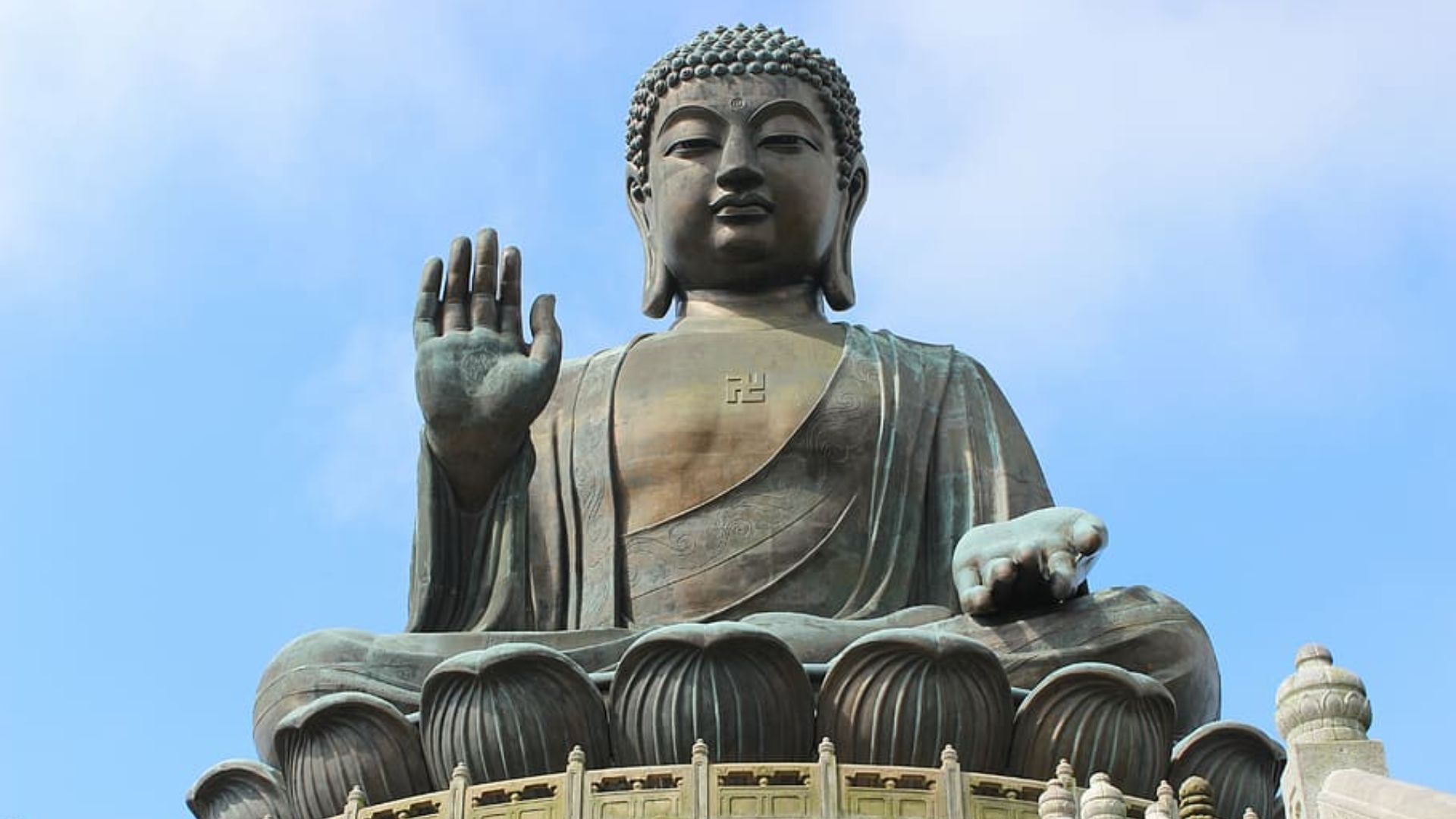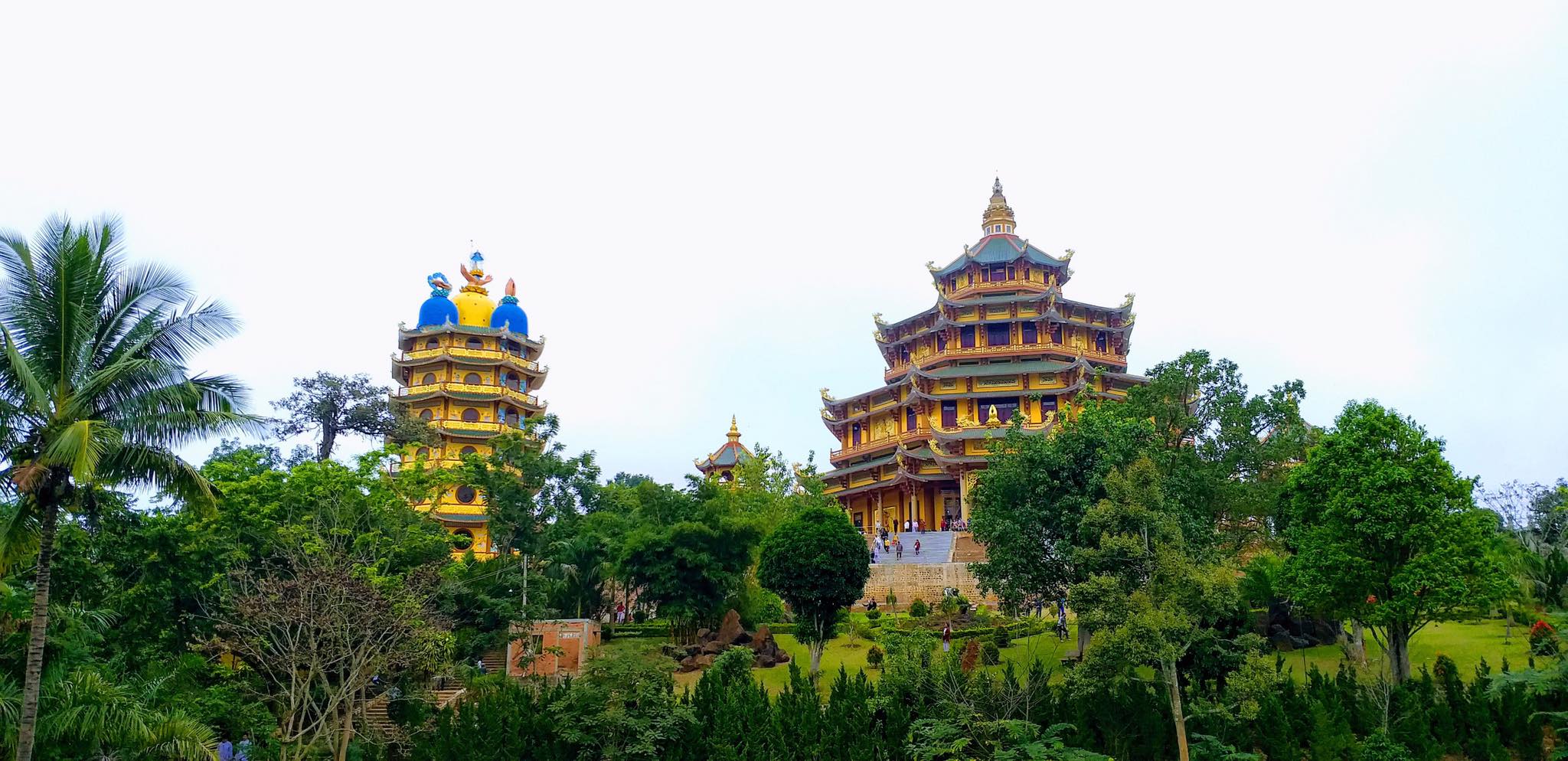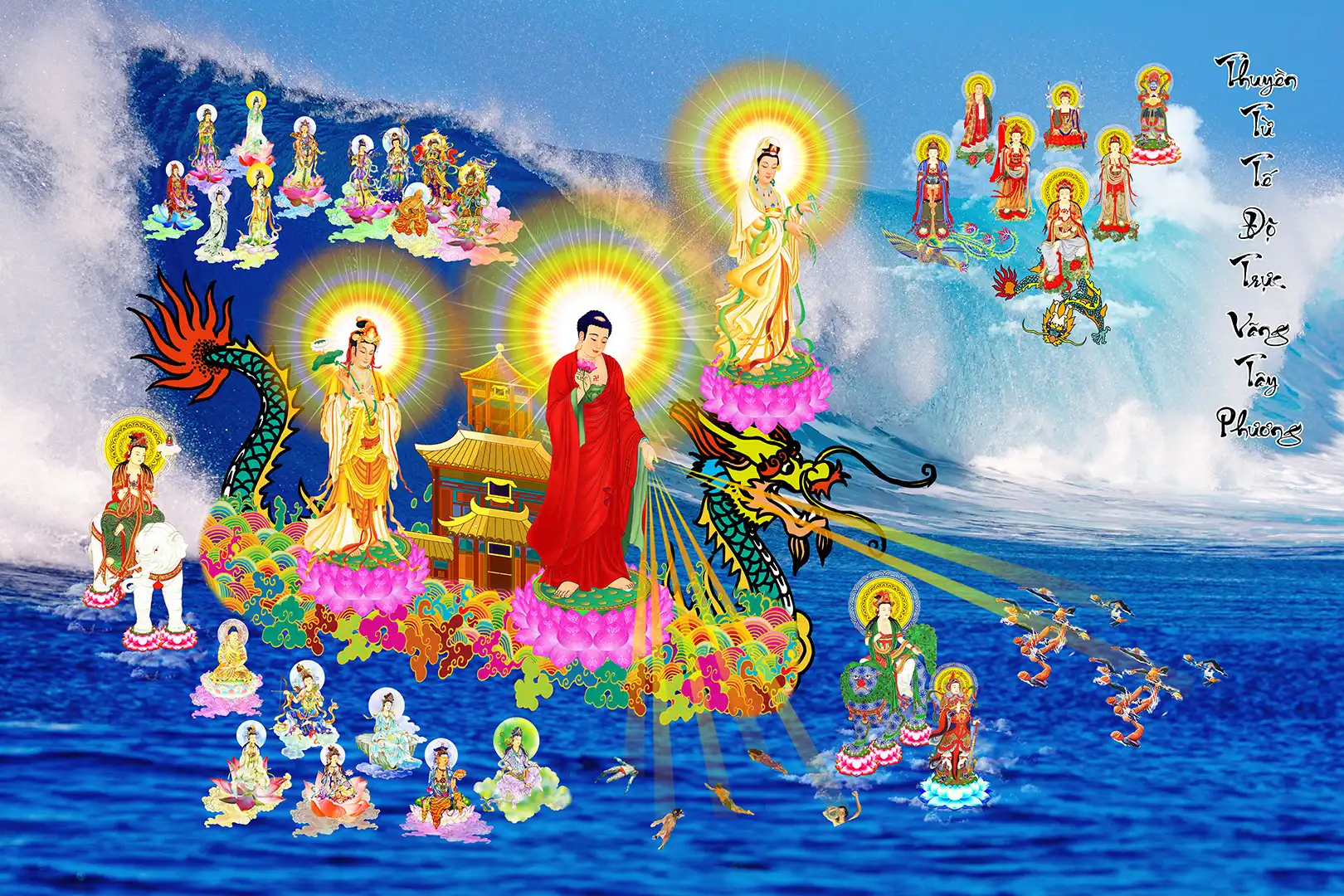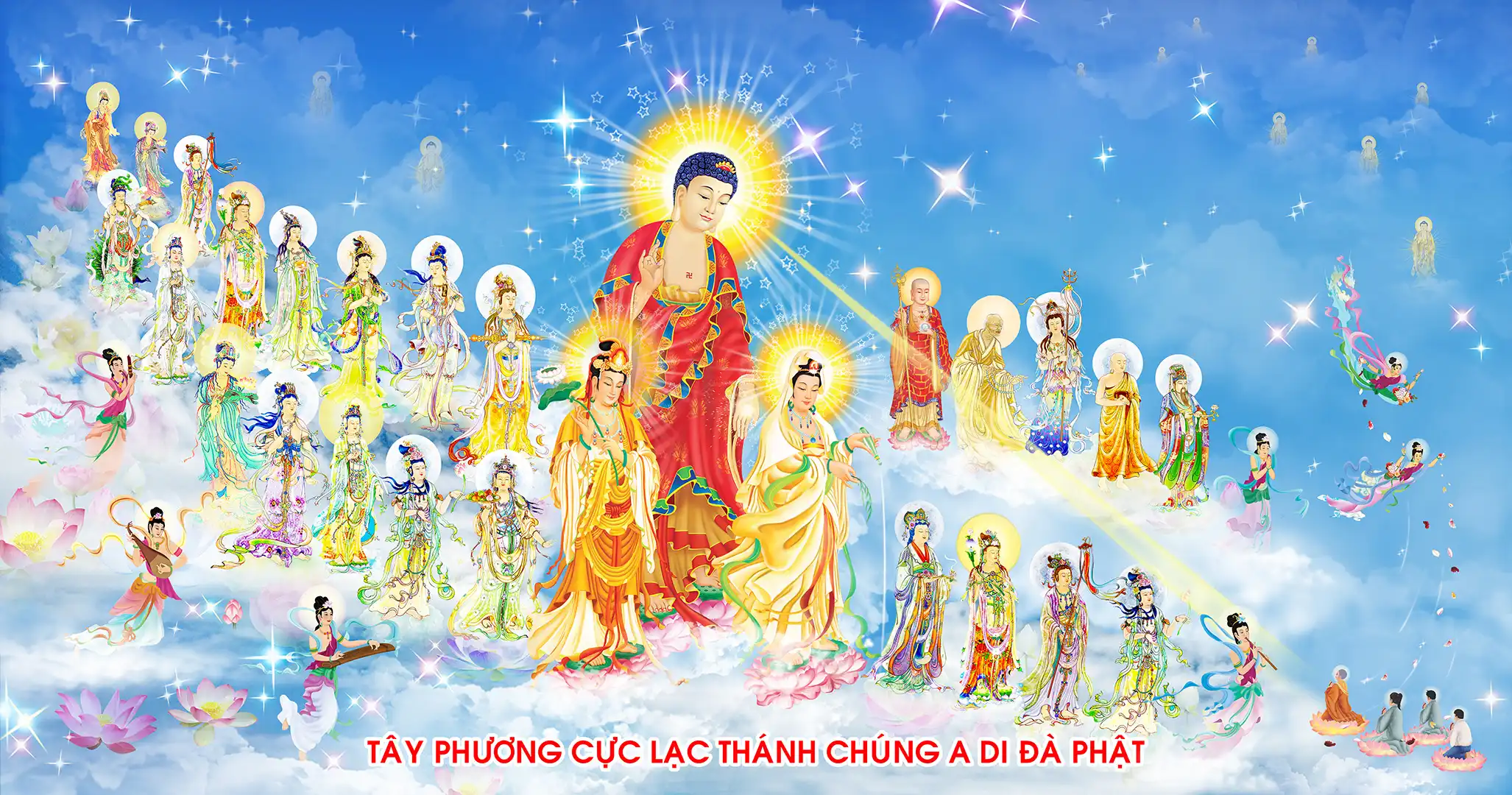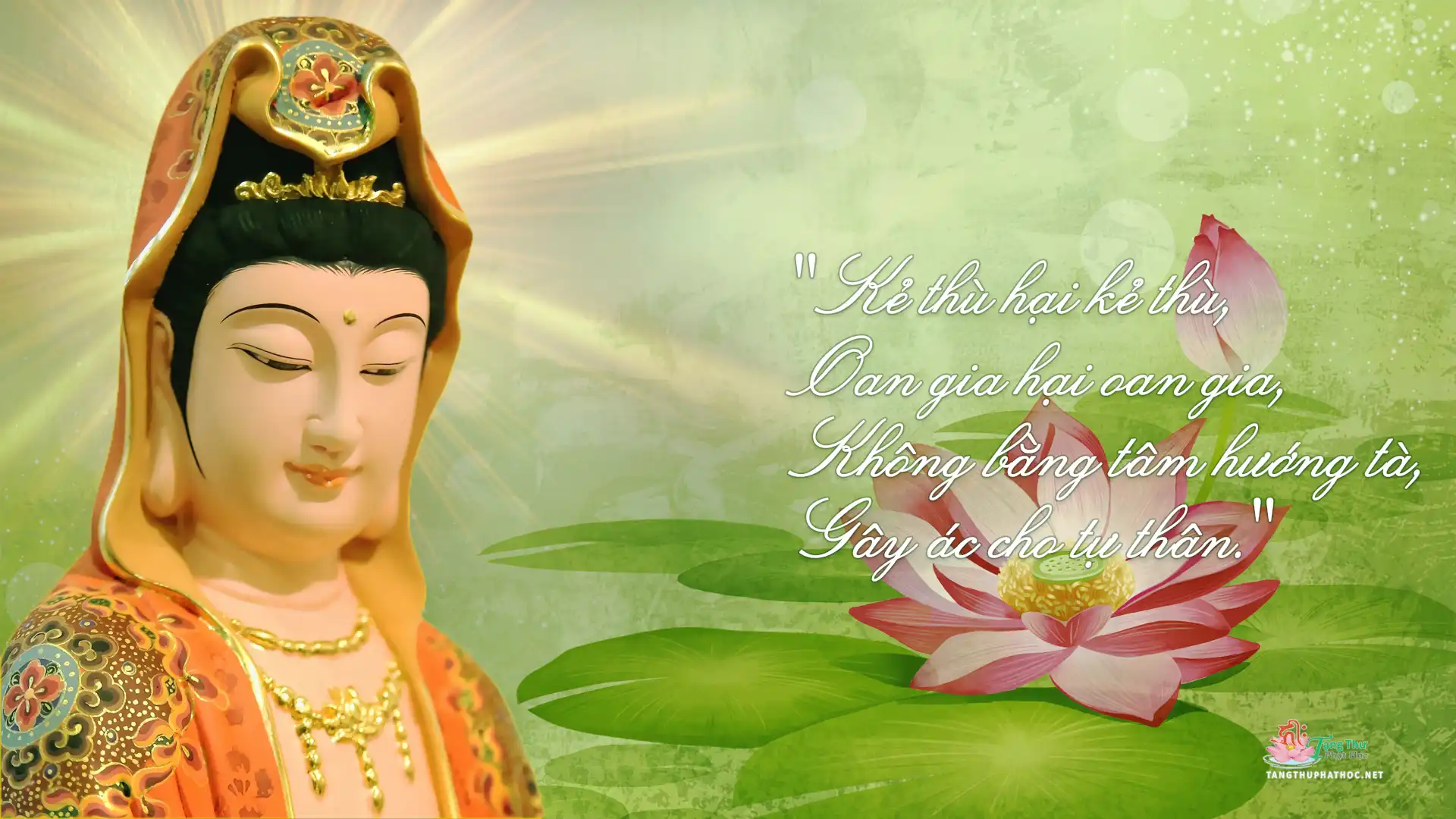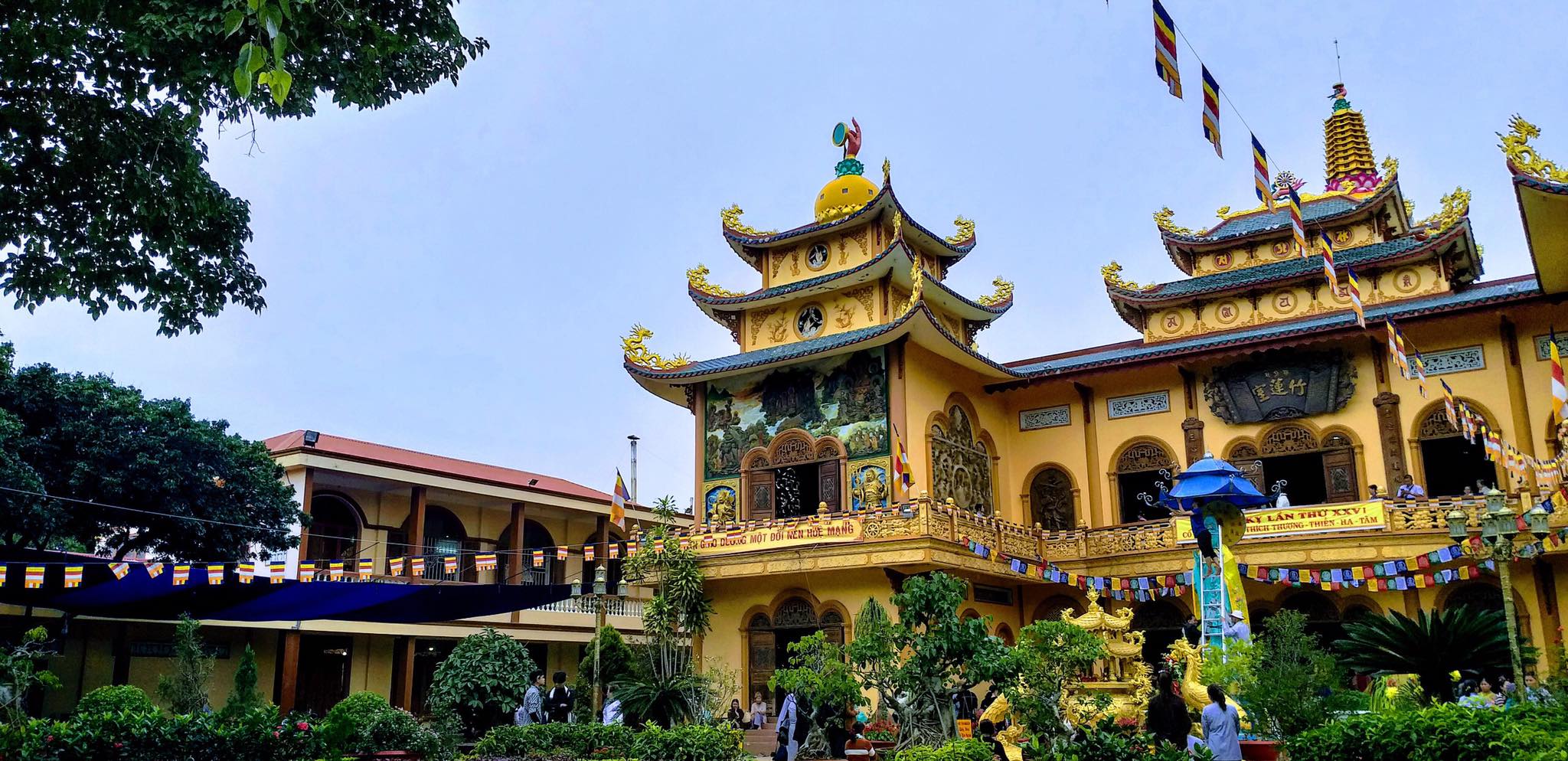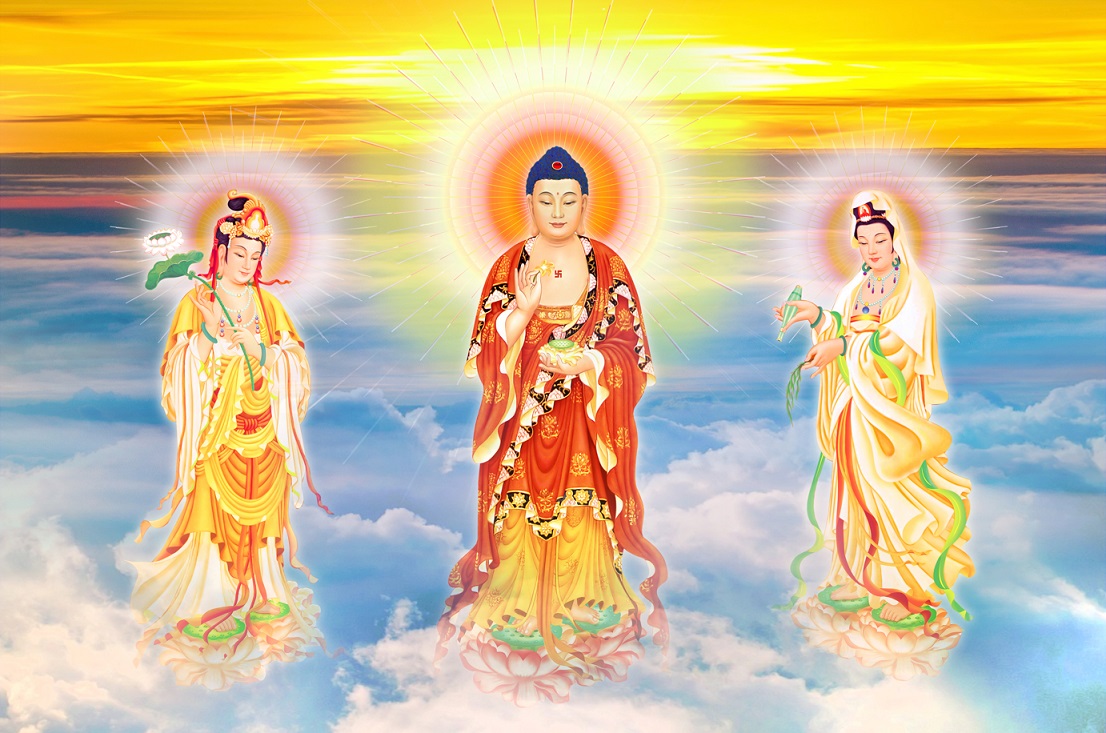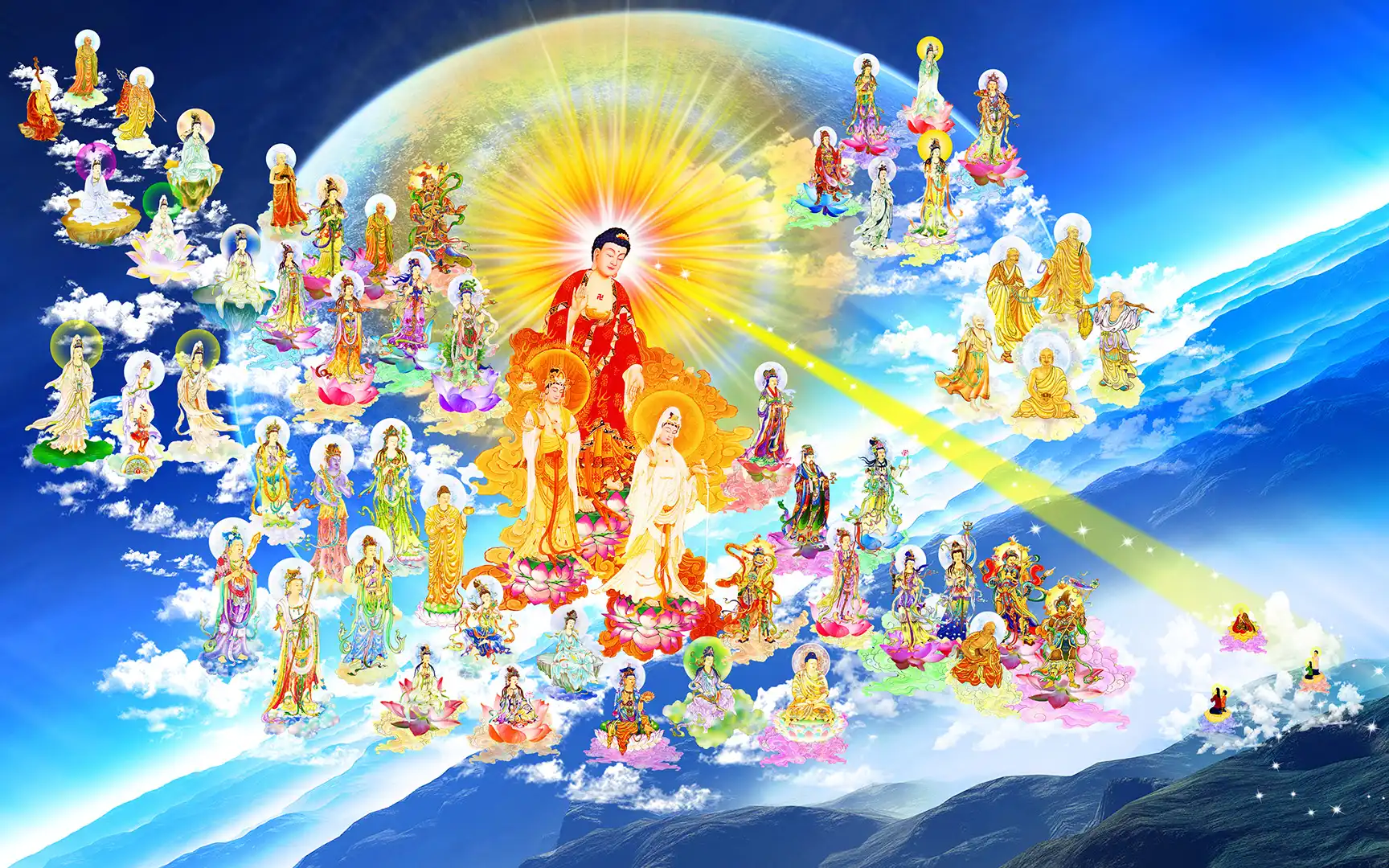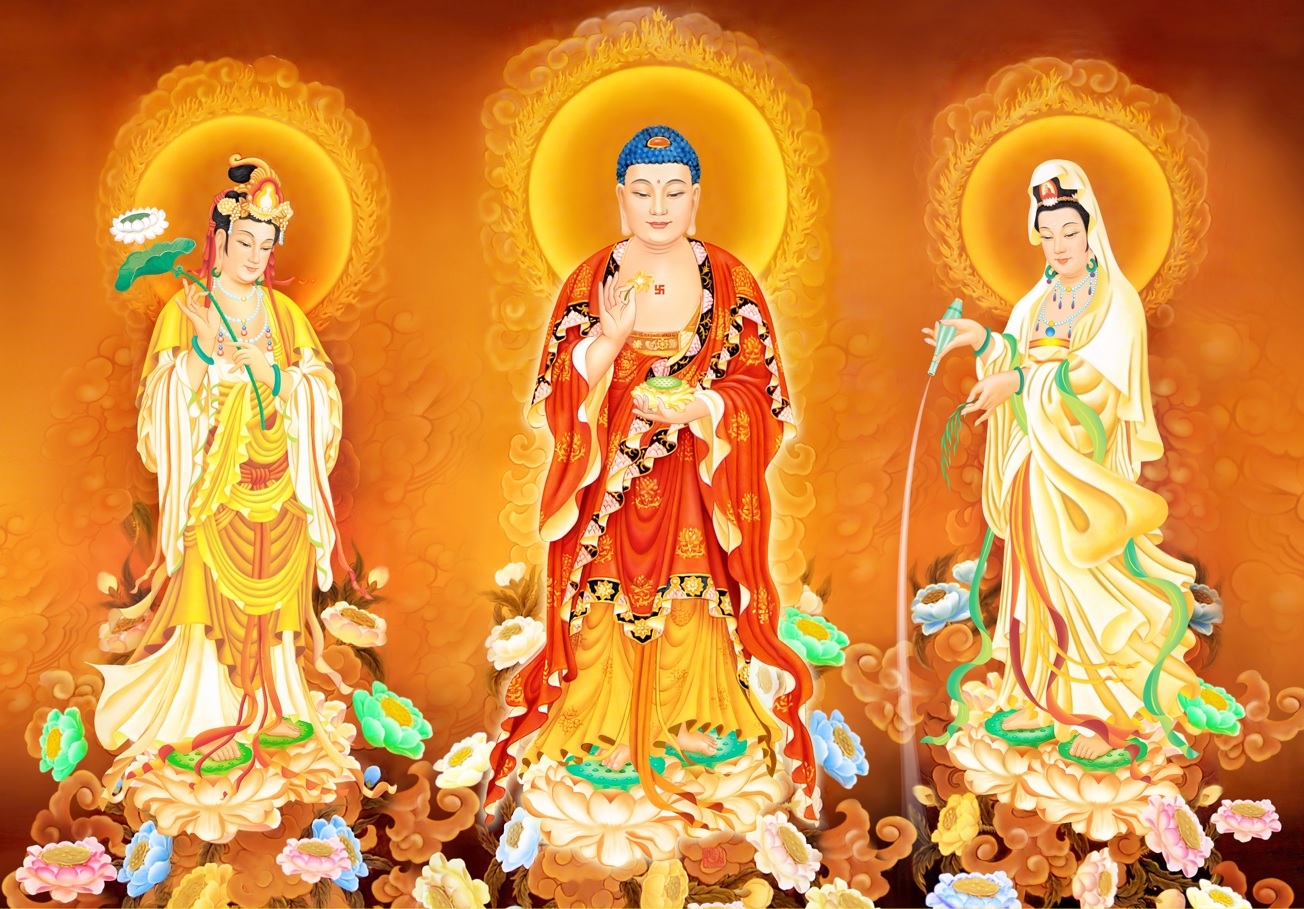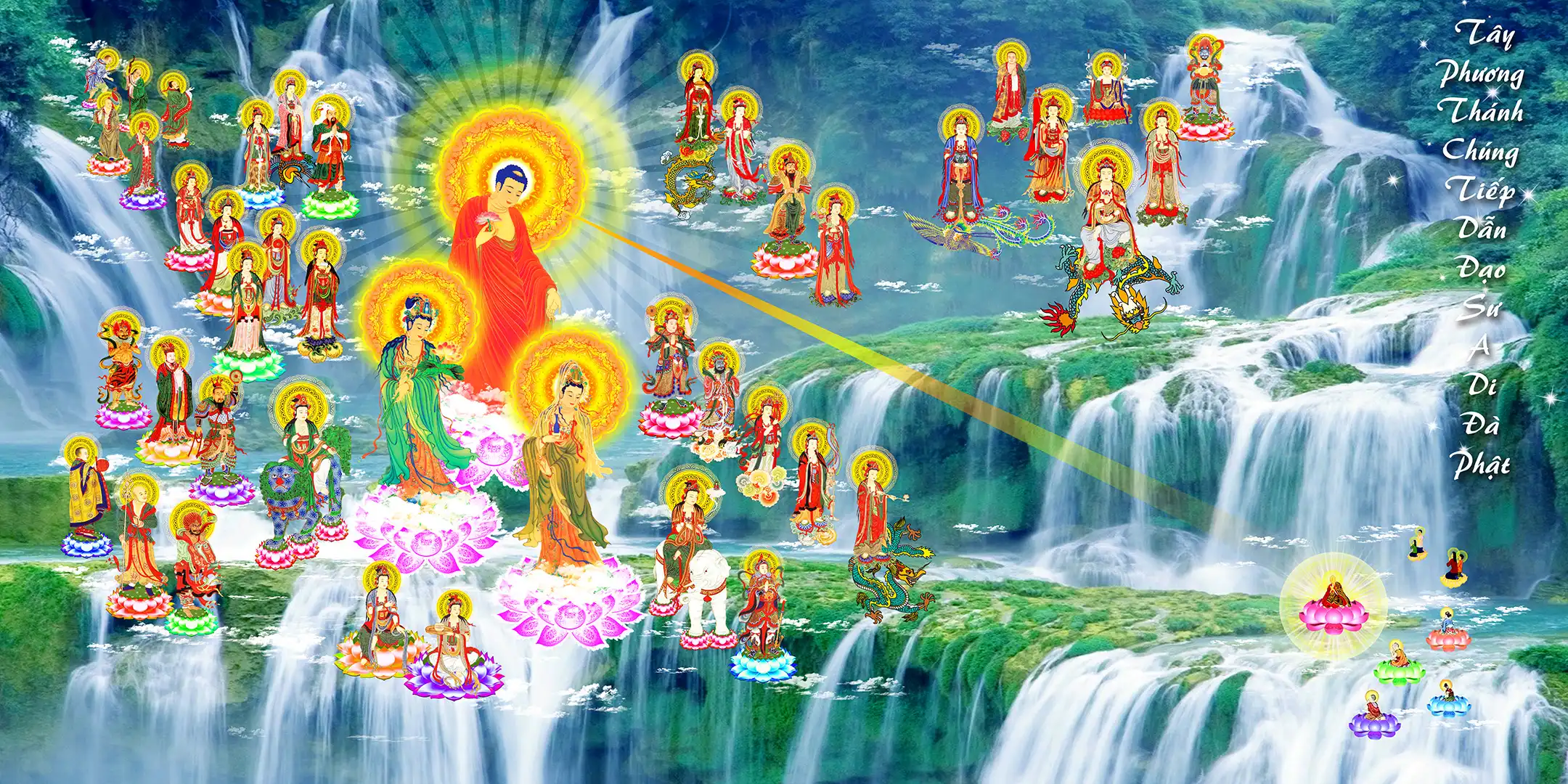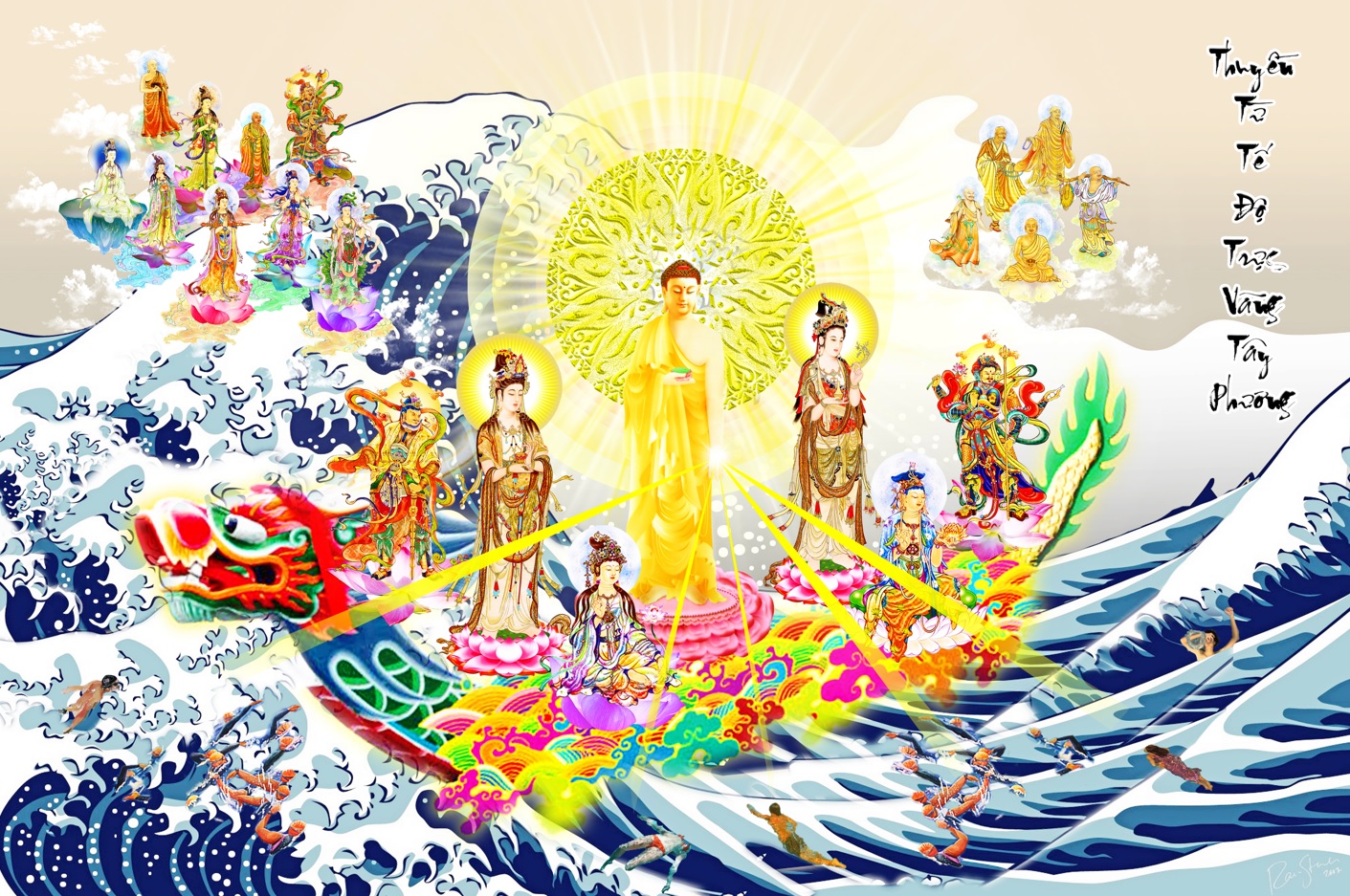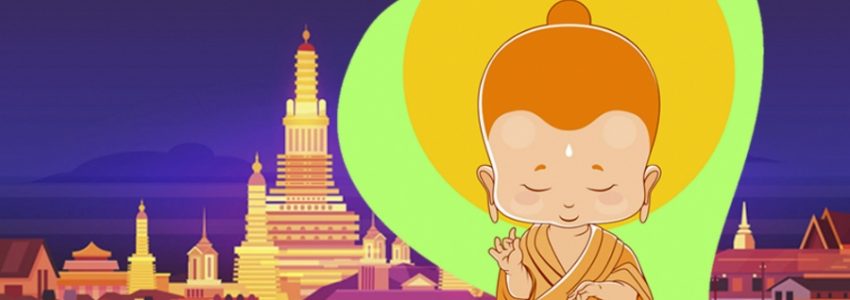THE SORROWLESS FLOWERS
Thiện Phúc
VOLUME I
161. To Be on a Vegetarian Diet
162. “Meat Eating” in the Buddhist Point of View
163. Clean and Unclean flesh
164. Vegetarian Days
165. Eight Reasons for Not Eating Animal Food
166. Non-Retrogression
167.Worshipping in the Six Directions
168. Ullambana
169. The Dharma Exposition That is Applicable to Oneself
170. The Path of Truth
161. To Be on a Vegetarian Diet
Buddhist doctrine always emphasizes on the four sublime states of boundless loving-kindness, boundless compassion, boundless joy and boundless equanimity. Buddhists hold life to be sacred. They do not, therefore, kill or harm any sentient beings. And thus, most of Mahayana Buddhists vow to be vegetarians. Buddhists should not kill living beings to eat. Killing or slaughtering is the first of the five precepts. Killing animals for food is among the worst transgression in Buddhism. According to Tantric Buddhism, in the sutras, the Buddhist scriptures, Buddha once said to Ananda: “Ananda, if there is nobody, there is no dharma. If there is no food, there is no dharma. If there are no clothes, there is no dharma. Take care of your body, for the sake of the dharma.” Relating with the body is extremely important in the tantric tradition. However, we don’t make a personal trip out of it. We could become a vegetarian and sneer at meat eaters. We could wear pure cotton and renounce wearing any leather. Or we could decide to search for a country to live in that is free from pollution. But any of those approaches could be going too far. When someone becomes a vegetarian, he stops eating meat, but he might take a bloodthirsty delight in peeling bananas and crunching his teeth into peaches and cooking eggplants as meat substitutes. So our attempts to relate with the body can become very complicated. We’re not particularly advocating eating meat. Rather, we are pointing out that we do not accept our body as it is, and we do not accept our world. We are always searching for some way to have an easy ride. When we feel unhappy or uncomfortable, we think that we would like to go somewhere else, up or down or wherever. Some people call it hell, some people call it heaven, but whatever it is, we would like to have an easy ride somewhere.
The Buddha did not feel justified in prescribing a vegetarian diet for his disciples among the monks. What he did was to advise them to avoid eating meat because for whatever reason, eating meat means to support ‘killing,’ and animals had to be slaughtered only to feed them. Thus, before His parinirvana, the Buddha advised his disciples (monks and nuns) to practice vegetarianism. However, the Buddha did not insist his lay disciples to adhere to a vegetarian diet. Buddhists should practice vegetarianism methodically and gradually. We should not give up right away the habit of eating meat and fish to have vegetarian diet. Instead, we should gradually reduce the amount of meat and fish, then, start eating vegetables two days a month, then four days, ten days, and more, etc. Eating a vegetarian diet is not only a form of cultivating compassion and equality, but it is also free us from many diseases. Furthermore, such a diet can provide us with a lot of vitamins, and easy to digest. We should not judge the purity and impurity of a man simply by observing what he eats. Through his own evil thoughts and actions, man makes himself impure. Those who eat vegetables and abstain from animal flesh are praiseworthy. Those who still eat meat should be cautious, for no matter what you say, you are still eating sentient beings’ flesh. You can say “I don’t hear,” or “I don’t see” the animal was killed for my food, but are you sure that the purpose of killing is not the purpose of obtaining food for you? Be careful!!!
162. “Meat Eating” in the Buddhist Point of View
In the Buddhist precept of prohibiting killing, one might expect that Buddhists would also enjoin (bắt phải theo) vegetarianism. However, according to the Pali Canon, which is collected by early Theravada schools and is believed by the current only exisitng Theravada, there are several places in which the subject is raised, and in all of them the Buddha explicitly refuses to require that monks abstain from meat. They said as mendicants, the monks subsisted on alms food, and the Vinaya repeatedly indicates that they are to eat whatever is given to them, viewing it only as a means to sustain life. Refusing alms food deprives the donor of an opportunity for making merit, and it also leads to negative feelings toward the Samgha from people whose offerings are refused. There are, however, some restrictions. Certain types of meat are forbidden, including human flesh, as well as meat from dogs, snakes, elephants, horses, and carnivores (loài ăn thịt sống). The Vinaya-Pitaka (IV. 237) states that monks can only eat meat that is “pure in the three respects,” which means that they must not have seen, heard, or suspected that an animal was killed for them. The Vinaya commentary explains that if a monk is suspicious of the origin of meat, he should inquire how it was obtained. Reasons for suspicion include evidence of hunting, absence of a butcher nearby, or the bad character of a donor. If these conditions are met, however, the monk is “blameless.” If a donor kills, or causes someone else to kill an animal to feed monks, this results in negative karma for the giver. The Pali Canon also reports that the Buddha’s cousin Devadatta specifically asked him to make vegetarianism compulsory, but he refused to do so, only allowing that it was acceptable as an optional ascetic practice. These examples indicate that the Buddha and his followers would have frequently eaten meat on their begging rounds. This does not mean, however, that the killing of animals is condoned (được tha thứ). Occupations that involve killing, such as butchery, are condemned as examples of “wrong livelihood,” and in Buddhist countries today these tasks are commonly performed by non-Buddhists. Those who perform them are often treated as being karmically polluted. With regard to the consumption of meat as food, Buddhists themselves are divided into groups. One group regards eating meat as being no less wicked than the act of slaughter. It holds that, if meat was not used as food, there would be no cause for the destruction of animals, hence consumption of meat is directly responsible for their slaughter and is therefore wrong. Another group regards the consumption of meat is allowed by the Buddha. They claim that the Vinaya or diciplinary rule allows monks to eat meat under several conditions, called “three kinds of clean flesh,” “five kinds of clean flesh,” or “nine kinds of clean flesh.” No matter what you say, eating flesh still means eating flesh. Buddhists, especially, monks and nuns should show their loving-kindness and compassion to all sentient beings. Monks and nuns should try their best to prevent killing, and not to be the cause of killing through the form of offering of a so-called ‘clean flesh.’
In Theravada countries, vegetarianism is widely admired, but seldom practiced. Most laypeople eat meat, but there are certain observance days during which many people avoid it. In these countries, it is generally thought that is better to eat less intelligent animals, such as fish, and to eat small animals, rather than large ones. However, in Tibet the prevailing (thắng thế) philosophy is just the opposite: Tibetans generally believe that it is better to eat larger animals, since a single large animals can be used to feed many people, and they don’t need to kill so many small ones. There are, however, a number of Mahayana texts that argue against eating meat, emphasizing that it is incompatible with the Bodhisattva practices of generating compassion toward all sentient beings and viewing them as one’s former mothers. The Mahaparinirvana-Sutra, for example, states that meat-eating “extinguishes the seed of great compassion,” and in it the Buddha orders his followers to adopt a vegetarian diet. The Lankavatara Sutra also has a chapter in which the Buddha mentions eight reasons why a Buddhist, especially a monk or a nun should not eat meat. He mentions that in early days of Buddhism, most of Buddhists’ ability of understanding his profound teachings is very limited so he did not want to force them to follow strict discipline right away. But to this moment, the Buddha must remind all of his followers that if they still believe in the rule of “cause and effect,” they should minimize their “meat eating” for there is a cause, no matter what kind of cause it is, there will be surely an effect, without any exception. The Buddha further reminded, “Buddhists should always remember that all beings in past lives were at least once one’s fathers, mothers, relatives, and friends.” In addition that the smell of carnivores frightens beings and leads to a bad reputation; that eating meat interferes with meditative practice; that eating meat leads to bad dreams and anxiety; that it leads to bad rebirths; and that even if one only eats meat that was not explicitly killed for oneself, one is still participating in the process of of killing and thus promotes the suffering of sentient beings. The Mahaparinirvana-Sutra, Lankavatara Sutra and other Mahayana sutras were widely popular in East Asia, and this may partly account for the fact that most monasteries in China, Korea and Vietnam are strictly vegetarian. In Japan, vegetarianism is often viewed as admirable by Buddhists, and is formally practiced in most Zen monasteries. Vegetarianism is also enjoined in the supplementary monastic code known as the Brahma-jala-sutra, which is widely influential in East Asia. An early East Asian example of this attitude is the proclamation by Emperor Wu in 511 prohibiting meat eating and hunting. Vegetarianism is always practiced by some pious laypeople in East Asia and is often seen as being entailed (kết quả của) by the precept prohibiting killing. In Tibetan and Mongolian Buddhism, however, vegetarianism is seldom practiced. The Dalai Lama has urged Tibetans to eat less meat, and if still eating meat, they should eat larger animals in order to reduce the number of deaths, but is not a vegetarian himself. In the harsh environment of Tibet, vegetarianism was not feasible, since the soil and climate could not support large-scale agriculture, so only a few lamas have adopted a vegetarian diet in exile. The question of how monks and nuns can clearly expound the Buddha teachings so that Buddhists can view that according to the rule of “cause and effect,” or “karma,” all sentient beings as their fathers, mothers, relatives, or friends. However, most lamas either avoid the subject or advise students to chant Mantras to help the animals achieve a better rebirth. There is considerable uneasiness concerning this subject among Tibetan Buddhist teachers, most of whom would clearly prefer to avoid it altogether. As the remarks above indicate, there is no unanimity among Buddhists regarding the eating of meat, and there is a wide variety of opinions in Buddhist canonical literature.
163. Clean and Unclean flesh
Pure flesh, or clean flesh or pure meat to a monk. In early time of Buddhism, the Buddha always emphasizes “Compassion.” All Buddhists, including monks and nuns, should know what he means. If you say you are compassionate to all sentient beings and you are still eating meat every day (especially monks and nuns), what does “compassion” mean? At the time of the Buddha, the reason why the Buddha allowed monks and nuns to eat whatever lay people offered because there was huge drought in India that caused the disappearance of most vegetables. That was why the Buddha allowed monks and nuns to eat what he called “Three kinds of clean flesh.” As long as a monk does not kill an animal himself or the animal has not been killed specifically for him, or he does not see or is not aware of it being killed specifically for him, or he does not hear it cries. Other words, the meat is considered clean when the Monk has not seen the animal killed (or the animal’s slaughter is not witnessed by the consumer); has not heard the animal killed (or the sound of the animal’s slaughter is not heard by the consumer); and has not doubt about the animal killed to offer to the monk’s meal (or the animal is not slaughtered for the consumer). On the contrary, the meat is considered unclean when the Monk has seen the animal killed; has heard the animal killed; and has doubted that the animal killed to offer to him. Besides, the meant is also considered clean when the creatures that have died a natural death; and the creatures that have been killed by other creatures. Or the creatures not killed for us; or naturally dried meat; or things not seasonable or at the right time. That was the time of the Buddha when one could not find any vegetables. What about now, we do not lack vegetables and a varieties of fruits and vegetables contain adequate vitamins for a human body. Be careful!!!
164. Vegetarian Days
In Buddhism, ideally speaking, Buddhists should be lifetime vegetarians; however, this is very difficult for lay people. So certain days out of each month are denoted as a day not to eat meat. The reason behind this is simple. The Buddha taught that each sentient being, including animals, values life, so not to eat meat is to practice being compassionate. Vegetarian Days of the month are the first, the fourteenth, the fifteenth, and the thirtieth lunar calendar. Besides, vegetarian days also include days of offerings to the dead, ceremonial days, or the day lay Buddhists strictly follow the eight commandments in one day and one night. Furthermore, there are also nine days of abstinence on which no food is eaten after twelve o’clock and all the commandments must be observed. On these days Indras and the four deva-kings investigate the conduct of men. Nine days of abstinence include every day of the three months: the first, the fifth, and the ninth month, every day of the first month, every day of the fifth month, everyday of the ninth month; and other months each month six days as follow: the 8th, the 9th, the 14th, the 23rd, the 29th, and the 30th.
Besides the above mentioned vegetarian days, devout Buddhists don’t eat meat on the “Thirty Worshipping Days” because these days of the month on which a particular Buddha or Bodhisattva is worshipped, he is being in special charge of mundane affairs on that day (lunar calendar). These Thirty Worshipping Days include: Dhyana-Light Buddha on the first day of the month; Dipankara Buddha on the second day of the month; Prabhutaratna on the third day of the month; Aksobhya Buddha on the fourth day of the month; Maitreya Bodhisattva on the fifth of the month; Twenty Thousand-Lamp Buddha on the sixth day of the month; Thirty Thousand-Lamp Buddha on the seventh day of the month; Bhaisajyaraja-Samudgata Buddha on the eighth day of the month; Mahabhijna-Jnanabhibhu Buddha on the ninth day of the month; Candra-Surya-Pradipa Buddha on the tenth day of the month; Delightful Buddha, the eleventh day of the month; Unconquerable Buddha on the twelfth day of the month; Akasagarbha Bodhisattva (Bodhisattva of Space) on the thirteenth day of the month; Samantabhadra Bodhisattva, the fourteenth day of the month; Amitabha Buddha on the fifteenth of the month; Dharani Bodhisattva on the sixteenth of the month; Nagarjuna Bodhisattva on the seventeenth of the month; Kuan-Yin or Avalokitesvara Bodhisattva on the eighteenth of the month; The Sun-Light Bodhisattva on the nineteenth of the month; The Moon-Light Bodhisattva on the twentieth of the month; Infinite Resolve Bodhisattva on the twenty-first day of the month; Abhayandada Bodhisattva on the twenty-second day of the month; Mahasthamaprapta Bodhisattva on the twenty-third day of the month; Earth-Store Bodhisattva on the twenty-fourth of the month; Manjusri Bodhisattva on the twenty-fifth of the month; Supreme Bhaisajyaraja-samudgata Bodhisattva on the twenty-sixth day of the month; Vairocana Buddha on the twenty-seventh day of the month (same as in #28); Vairocana Buddha on the twenty-eighth of the month (same as in #27); Bhaisajyaraja-samudgata Bodhisattva on the twenty-ninth day of the month; and Sakyamuni Buddha on the thirtieth of the month.
165. Eight Reasons for Not Eating Animal Food
There exist some sects that do not forbid flesh. They argue that meat was permitted by the Buddha during His time, but forbidden in Mahayana under the Bodhisattva cult. According to Zen Master Suzuki in Studies in The Lankavatara Sutra, there are eight reasons for not eating animal food as recounted in The Lankavatara Sutra:
First, all sentient beings are constantly going through a cycle of transmigration and stand to one another in every possible form of relationship. Some of these are living at present even as the lower animals. While they so differ from us now, they all are of the same kind as ourselves. To take their lives and eat their flesh is like eating our own. Human feelings cannot stand this unless one is quite callous. When this fact is realized even the Rakshasas may cease from eating meat. The Bodhisattva who regards all beings as if they were his only child cannot indulge in flesh-eating.
Second, the essence of Bodhisattvaship is a great compassionate heart, for without this the Bodhisattva loses his being. Therefore, he who regards others as if they were himself, and whose pitying thought is to benefit others as well as himself, ought not to eat meat. He is willing for the sake of the truth to sacrifice himself, his body, his life, his property; he has no greed for anything; and full of compassion towards all sentient beings and ready to store up good merit, pure and free from wrong discrimination, how can he have any longing for meat? How can he be affected by the evil habits of the carnivorous races?
Third, this cruel habit of eating meat causes an entire transformation in the features of a Bodhisattva, whose skin emits an offensive and poisonous odour. The animals are keen enough to sense the approach of such a person, a person who is like a Rakshasa himself, and would be frightened and run away from him. He who walks in compassion, therefore, ought not to eat meat.
Fourth, the mission of a Bodhisattva is to create among his fellow-beings a kindly heart and friendly regard for Buddhist teaching. If they see him eating meat and causing terror among animals, their hearts will naturally turn away from him and from the teaching he professes. They will then loose faith in Buddhism.
Fifth, if a Bodhisattva eats meat, he cannot attain the end he wishes; for he will be alienated by the Devas, the heavenly beings who are his spiritual sympathizers and protectors. His mouth will smell bad; he may not sleep soundly; when he awakes he is not refreshed; his dreams are filled with inauspicious omens; when he is in a deserted place, all alone in the woods, he will be haunted by evil spirits; he will be nervous, excitable at least provocations; he will be sickly, have no proper taste, digestion, nor assimilation; the course of his spiritual discipline will be constantly interrupted. Therefore, he who is intent on benefitting himself and others in their spiritual progress, ought not to think of partaking of animal flesh.
Sixth, animal food is filthy, not at all clean as a nourishing agency for the Bodhisattva. It readily decays, putrefies (spoils), and taints. It is filled with pollutions, and the odour of it when burned is enough to injure anybody with refined taste for things spiritual.
Seventh, the eater of meat shares in this pollution, spiritualy. Once King Sinhasaudasa who was fond of eating meat began to eat human flesh, and this alienated the affections of his people. He was thrown out of his own kingdom. Sakrendra, a celestial being, once turned himself into a hawk and chased a dove because of his past taint as a meat-eater. Meat-eating not only thus pollutes the life of the individual concerned, but also his descendants.
Eighth, the proper food of a Bodhisattva, as was adopted by all the previous saintly followers of truth, is rice, barley, wheat, all kinds of beans, clarified butter, oil, honey, molasses and sugar prepared in various ways. Where no meat is eaten, there will be no butchers taking the lives of living creatures, and no unsympathetic deeds will be committed in the world.
166. Non-Retrogression
The Sanskrit word “Avaivartika” means “not falling back.” One who never recedes. One who never reverts to a lower condition. One who has reached the realization of emptiness (Tolerance and Non-birth) will never regress from the Buddha or Bodhisattva Paths. When one has reached the level where one does not fall back or non-retrogression is another way of saying one will achieve Buddhahood in one lifetime. A Bodhisattva who, in his progress towards Buddhahood, never retrogrades to a lower state than that to which he has attained. Non-backsliding means not to give up on or not to grow weary with current position, or not retreating, especially in terms of the Buddhist path of cultivation. According to various Mahayana scriptures, non-backsliding is the seventh of the ten abodes, but the Yogacarabhumi sastra says that the stage of non-backsliding is the first of the ten bhumis, and Fo-Hsing-Lun says it is the first of the ten dedications of merit. There are five non-backslidings according to the Dharmalaksana (Fa-Hsiang).
A Avaivartika is one who never recedes; a Bodhisattva who, in his progress towards Buddhahood, never retrogrades to a lower state than that to which he has attained (a Bodhisattva who is in the stage of non-backsliding). According to The Amitabha Sutra, even those who dwell in lowest level of the Pure Land, and have been born there bringing along their karmic burdens, do not fall back from their position, from their practice, or from their mindfulness. One who has reached the realization of emptiness (tolerance and non-birth) will never regress from the Buddha or Bodhisattva Paths. Non-regression sometimes simply denotes an advanced stage of aspiration and practice from which one will never retreat. Also according to the Amitabha Sutra, living beings burdened with heavy karma accumulated from time immemorial. They cannot escape Birth and Death in one lifetime, and are in danger of retrogression during. Thus the Buddha offered and recommended the Pure Land teachings, an easy method to escape Birth and Death in one lifetime through rebirth in the Pure Land, where practitioners can continue cultivating without fear of retrogression, for those who are reborn in the Pure Land have the highest level Bodhisattvas as their companions and are free from all obstacles, calamities and evil conditions. Moreover there are no externalists or evil demons , so their Minds are always calm and still. This is one of the five reasons why those who are reborn in the Pure Land achieve non-retrogression.
A Sanskrit term for “Irreversible levels.” These are stages beyond which a Bodhisattva is no longer capable of backsliding, generally said to be the eighth through tenth “levels” or “bhumi.” According to Most Venerable Thích Thiền Tâm in The Thirteen Patriarchs of Pureland Buddhism, what is a Non-Retrogression Mind? It is necessary to know that even if repentance-vow has been made and the cultivated path has been taken, but cultivators still encounter the following obstructions: binding karma, afflictions as well as other demonic obstructions are not easy to eliminate and destroy; cultivating for the six Paramitas and ten thousand conducts of Bodhisattvas are not easy to attain; and the path toward achieving the Ultimate Bodhi is an extremely long process; it is not easy to accomplish either. Furthermore, cultivators must develop firm vows of non-retrogression, even if this body has to endure infinite degradations, pains, and sufferings; or even if this body is burned to ashes, I am determined not to commit wicked transgressions; I am determined not to regress on my cultivated path; and I am determined to use this “Non-Retrogression Mind” to practice for enlightenment and to save other sentient beings.
There are three kinds of non-retreat. First, “Non-retreat from position”, or never receding from position attained. Having entered the holy stream or the four levels of sagehood culminating in Ahratship, they do not fall back to the levels of gods and men. Second, “Non-retreat from line of good action pursued” or “Non-retreat from practice”, or never receding from a right course of action. As followers of the Bodhisattva path they continue to work for the salvation of all beings, and do not fall back to the level of Lesser Vehicles with their concern limited to individual salvation. Third, “Non-retreat from mindfulness” or never receding from pursuing a right line of thought or mental discipline in dhyana. From mind-moment to mind-moment, they flow into the ocean of all knowledge. Besides, according to the Dharmalaksana, there are other kinds of non-backslidings such as never receding from place or abode attained; never receding from the faith obtained; never receding from the position attained; never receding from the realization attained; never receding from a right course of action; and never receding from being in accordance with procedures. However, ancient virtues always reminded about three analogies concerning retrogression of practitioners. The first analogy, when we crush prairie grass with a stone block, though the grass cannot grow, its roots are not yet rotten or destroyed. If conditions arise that cause the stone to be overturned, the grass will continue to grow as before. The second analogy, when we pour water into a jar, though the impurities are deposited at the very bottom, they are not yet filtered out. If conditions change and the water is stirred up, the impurities will rise. The third analogy, take the case of clay which is molded into earthernware would certainly disintegrate. The strong probability that those who have merely experienced an Awakening will retrogress during transmigration is similar to the above examples.
The Infinite Sutra confirms that those who achieve rebirth in the Pure Land always dwell in correct samadhi, and are all at the stage of “Avaivartika” or non-retrogression. The ancients have said: “Without a vow to be reborn, rebirth cannot be achieved; however, with a sincere vow, all achieve rebirth. Without rebirth in the Pure Land, the stage of non-retrogression cannot easily be reached; however, with rebirth, all achieve non-retrogression. According to Most Venerable Thích Thiền Tâm in the Treatise on The Ten Doubts, question number 19, there are five reasons why those who are reborn in the Pure Land achieve non-retrogression. First, the power of the Buddha’s great, compassionate vow embraces and protects them. Second, the Buddha’s light or wisdom always shines upon them, and, therefore, the Bodhi Mind of these superior people will always progress. Third, in the Western Pure Land, the birds, water, forests, trees, wind and music all preach the Dharma of ‘suffering, emptiness, impermanence and no-self.’ Upon hearing this, practitioners begin to focus on the Buddha, the Dharma and the Sangha. Fourth, those who are reborn in the Pure Land have the highest level Bodhisattvas as their companions and are free from all obstacles, calamities and evil conditions. Moreover there are no externalists or evil demons , so their Minds are always calm and still. Fifth, once they are reborn in the Pure Land, their life span is inexhaustible, equal to that of the Buddhas and Bodhisattvas. Thus they can peacefully cultivate the Dharma for countless eons.
167. Worshipping in the Six Directions
Sigalaka was a young man who came from a wealthy family. According to the Sigalaka Sutra, once the Lord was staying at Rajagaha, at the Squirrel’s Feeding Place in the Bamboo Grove. And at that time, Sigalaka the householder’s son, having got up early and gone out of Rajagaha, was paying homage, with wet clothes and hair and with joined palms, to the different directions: to the east, the south, the west, the north, the nadir and the zenith. And the Lord, having risen early and dressed, took his robe and bowl and went to Rajagaha for alms and seeing Sigalaka paying homage to the different directions, he said: “Householder’s son, why have you got up early to pay homage to the six different directions?” (east, west, south, north, upwards, downwards). Lord, my father, when he was dying, told me to do so. And so Lord, out of respect for my father’s words, which I revere, honor and hold secred, I got up early to pay sacred homage in this way to the six directions.
We will get out of life what we put into it. According to the Buddha, in fact we do not need to suffer at all if we live as we should do, in obedience to Noble Truths, not in obedience to the blind bows. The true nature of life is meant to be joyful, pleasant, and happy. It is we who have put the suffeirngs and afflictions into it by our own ignorance. In fact, we will get out of life what we put into it, no exception! So if our life is full of sufferings and afflictions, we must have placed into it thoughts, words and actions which brought about sufferings and afflictions. Devout Buddhists should always understand this so that we are able to put it in a different way, so that we will not continue to live ignorantly; on the contrary, we will live wisely under the light of Buddhism. These people should be very happy, for they have replaced hatred with love, attachments with abandonments, jealousy with cheerfulness, greed and selfishness with charity and serving other people.
The Buddha taught Sigalaka the right way to pay homage to the six directions. After witnessing the young man Sigalaka paying sacred homage in this way to the six directions, but not knowing who he paid homage to, at that time, the Buddha sat down beneath a tree and expalined to Sigalaka: “But householder’s son, that is not the right way to pay homage to the six directions according to the Ariyan discipline.” Well, Lord, how should one pay homage to the six directions according to the Ariyan discipline? It would be good if the Blessed Lord were to teach me the proper way to pay homage to the six directions, according to the Ariyan discipline. Then listen carefully, pay attention and I will speak. “Yes, Lord,” said Sigalaka. Young householder, it is by abandoning the four defilements of action; by not doing evil from the four causes; by not following the six ways of wasting one’s substance; through avoiding these fourteen evil ways, that the Ariyan disciple covers the six directions, and by such practice becomes a conqueror of both worlds, so that all will go well with him in this world and the next, and at the breaking up of the body after death, he will go to a good destiny, a heavenly world. The Buddha added: “Sigalaka! The East represents one’s parents. Parents being kind and children filial is the real worship of the East. The West represents the married couple. The husband and wife should mutually respect and love each other. Observance of this relation is the worship of the West. The South represents one’s teachers. As students, you should accept your teachers’ instructions with great respect, and follow them as a matter of principle. This is the worship of the South. The North represents one’s friends. Friends and relatives should cooperate and encourage one another. Stop all evils and do whatever is good. This conduct is the same as worshipping the North. The Lower Direction represents one’s subordinates. Treat the servants and subordinates with kindness and compassion. Harmonize the relationship between master and servant. This is the worship of the Lower Direction. The Upper direction represents the Bhiksus. Buddhists should always revere and respect the Triple Gem, and widely cultivate the field of blessedness. This is the worship of the Upper direction.”
168. Ullambana
Ullambana may be another form of Lambana, or Avalamba, meaning “hanging down,” “depending,” “support.” It is interpreted as “To hang upside down,” or “to be in suspense,” referring to extreme suffering in purgatory. The Ullambana Basins usually celebrated on the 15th day of the 7th month Lunar calendar. Vietnamese people also call Ullambana the Festival of the Hungry Ghosts, celebrated on the fifteenth day of the seventh month lunar calendar. The origin of this ceremony is to be found in the story of Maudgalyayana, who thanks to his divine eye saw that his mother had been reborn as a hungry ghost, and he wanted to save her; however, he didn’t know what to do. He went back to ask the Buddha the way to save his mother. The Buddha told him that only the combined effort of all Buddhist monks could help her escape her fate. From this tradition, developed the custom of offering food, clothes and so on to the clergy on Ullambana. “Ullambana” is a Sanskrit term for “Hanging upside down.” “Hanging down,” “depending,” “support.” It is interpreted as “To hang upside down,” or “to be in suspense,” referring to extreme suffering in purgatory. The condition of certain condemned souls, especially for whom the Ullambana or Lambana festival is held in seventh month. Festival of the hungry ghosts, celebrated on the fifteenth day of the seventh month lunar calendar. The Buddhist festival of Ullambana falls on the fifteenth day of the seventh month. It stems from the Ullambana Sutra, found in the Chinese Buddhist Canon, not found in the Tibetan or Pali Canons. The origin of this ceremony is to be found in the story of Maudgalyayana, who thanks to his divine eye saw that his mother had been reborn as a hungry ghost, and he wanted to save her. The Buddha told him that only the combined effort of all Buddhist monks could help her escape her fate. From this tradition, developed the custom of offering food, clothing, and so on to the clergy on Ullambana. Nowadays, countries with Buddhist tradition usually celebrate this festival to honor parents and ancestors. In East Asia Buddhist countries such China, Japan and Vietnam, people celebrated Festival of the hungry ghosts. On this day, ceremonies are held in which food, flowers and clothes are respectfully offered to the monks and nuns. Also together monks and nuns and lay followers, with a combination of effort, recite Ullambana sutra in order to sooth the torments of the deceased in the lower realms of existence. This holiday was first celebrated in 538 BC and is still celebrated today. Ullambana is also an opportunity for people to repay their parents’ grace. This is one of the three sources of felicity, the field for requiting blessings received, i.e. parents, teacher, etc. According to the Vietnamese tradition and traditions of some East Asian countries, the festival of “Offerings to the Spirits” also falls on the seventh month of the Lunar calender year. This is not a Buddhist Festival, but a common practicing of ancestor worship and worldly faith. According to the folk belief, for the whole seventh month of the lunar calendar year, hell beings, as well hungry ghosts are temporarily released to roam the earth. People often provide what they need in order to win their support and to prevent them from harming the living. However, according to Buddhism, rebirth takes place right after death, or the longest time for an intermediate body is forty-nine days. For those who are reborn in uninterrupted hells, there is no such temporary release. So there is no way the dead can roam around our world during the seventh month of the lunar calendar year.
The Buddha speaks the Ullambana Sutra: “Thus I have heard, at one time, the Buddha dwelt at Shravasti in the Garden of the Benefactor of Orphans and the Solitary. Mahamaudgalyayana had just obtained the six penetrations and wished to cross over his father and mother to repay their kindness for raising him. Thus using his wisdom eye to search for his deceased parents. He regarded the world and saw that his deceased mother had ben born among the hungry ghosts, having neither food nor drink, she was but skin and bones. Mahamaudgalyayana felt deep pity and sadness, filled a bowl with food and went to provide for his mother. She got the bowl, screened it with her left hand, and with her right hand she made the first fist of food. But before it entered her mouth, it turned into burning coals which could not be eaten. Mahamaudgalyayana called out and wept sorrowfully, and hastened to return to the Buddha to set forth all of this. The Buddha said: “Your mother’s offences are deep and firmly rooted. You alone do not have enough power. Although your filial sounds move heaven and earth, the Heaven spirit, the Earth spirit, Twisted demons, and Those outside the way, Brahmans, and the Four Heavenly King Gods are also without sufficient strength. The awesome spiritual power of the Assembled Sangha of the ten directions is necessary for liberation to be attained. I shall now speak a Dharma of rescue which causes all those in difficulty to leave worry and suffering, and to eradicate obstacles from offenses. The Buddha told Mahamaudgalyayana: “The fifteen day of the seventh month is the Pravarana Day for the Assembled Sangha of the ten directions. For the sake of Fathers and Mothers of seven generations past, as well as for fathers and mothers of the present who are in distress, you should prepare an offering of clean basins full of hundreds of flavors and five fruits, and other offerings of incense, oil, lamp, candles, beds, and bedding, all the best of the world, to the Greatly Virtuous Assembled Sangha of the ten directions. On that day, all the Holy Assembly, whether in the Mountains practicing Samadhi, or obtaining the Four Fruits (levels) of the Way, or walking beneath trees, or using the Independence of the Six Penetrations, to teach and transform. Sound Hearers and those Enlightened to Conditions, or provisionally manifesting as Bhikhus when in fact they are Great Bodhisattvas on the Tenth Ground. All complete in pure precepts and oceanlike virtue of the Holy Way, should gather in a Great Assembly and all of like mind receive the Pravarana Food. If one thus makes offerings to these Pravarana Sangha, one’s present father and mother, parents of the seven generations, as well as the six kinds of close relatives, will escape from the three paths of sufferings, and at that time attain release. Their clothing and food will spontaneously appear. If the parents are still alive, they will have wealth and blessing for a hundred years. Parents of seven generations will be born in the Heavens. Transformationally born, they will independently enter the celestial flower light, and experience limitless bliss. At that time the Buddha commanded the Assembled Sangha of the ten directions to recite Mantras and Vows for the sake of the donor’s family, for parents of seven generations. After practicing Dhyana concentration, they then may accept the food. When first receiving the basin, place it before the Buddha in the stupa. When the Assembled Sangha has finished the Mantras and Vows, then they may accept it. At that time the Bhikhsu Maudgalyayana and the Assembly of Great Bodhisattvas were all extremely delighted and the sorrowful sound of Maudgalyayana’s crying ceased. Also at that time Maudgalyayana’s mother obtained liberation from the kalpa of suffering as a hungry ghost. Maudgalyayana addressed the Buddha and said: “This disciple’s parents have received power of merit and virtue of the Triple Jewel, because of the awesome spiritual power of the Assembled Sangha. If in the future the Buddha’s disciples practice filiality by offering up the Ullambana basins, will they be able to cross over their present parents as well as those of the seven generations in the past? The Buddha replied: “Good indeed, I am happy you ask this question. I just wanted to speak about that and now you have also asked about it. Good man, if Bhikhsus, Bhikhusnis, Kings, Crown Princes, Great Ministers, Great Officials, Cabinet Members, the hundreds of Officers, and the Tens of thousands of Citizens wish to practice compassionate filial conduct, for the sake of the parents who bore them, as well as for the sake of fathers and mothers of seven lives past, on the fifteenth day of the seventh month, the day of the Buddha’s delight, the day of the Sangha’s Pravarana, they should place hundreds of flavors of foods in the Ullambana basins, and offer them to the Pravarana Sangha of the ten directions. They should vow to cause the length of life of the present father and mother to reach a hundred years without illness, without sufferings, afflictions, or worries, and also vow to cause seven generations of fathers and mothers to leave the sufferings of the hungry ghosts, to be born among Men and Gods, and to have blessings and bliss witohut limit.” The Buddha told all good men and good women, “Those disciples of the Buddha who cultivate filial conduct should in thought after thought, constantly recall their present fathers and mothers when making offerings, as well as the fathers and mothers of seven lives past. Every year, on the fifteeth day of the seventh month, they should always, out of filial compassion, recall their parents who bore them and those of seven lives past. And for their sakes perform the offering of the Ullambana basin to the Buddha and the Sangha and thus repay the loving kindness of the parents who raised and nourished them. All Buddhas’ disciples should respectfully receive this Dharma. At that time the Bhikhsu Maudgalyayana and the Four-fold Assembly of Disciples, hearing what the Buddha said, practiced it with delight. Namo Great Filial Maudgalyayana Bodhisattva ! (3 times).
169. The Dharma Exposition That is Applicable to Oneself
According to The Connected Discourses of the Buddha, Chapter Veludvara, the Buddha taught about the Dharma exposition applicable to oneself. Those who possess these below mentioned good qualities.
A noble disciple reflects thus: “I am one who wishes to live, who does not wish to die; I desire happiness and am averse to suffering. Since I am one who wish to live, who do not wish to die; if someone were to take my life, that would not be pleasing and agreeable to me. Now if I were to take the life of another, of one who wishes to live, who does not wish to die, who desires happiness and is averse to suffering; that would not be pleasing and agreeable to the other either. What is displeasing and disagreeable to me is displeasing and disagreeable to other too. How can I inflict upon another what is displeasing and disagreeable to me?” Having reflected thus, he himself abstains from the destruction of life, exhorts others to abstain from the destruction of life, and speaks in praise of abstinence from destruction of life. Thus this bodily conduct of his is purified. A noble disciple reflects thus: “If someone were to take from me what I have not given, that is, to commit theft, that would not be pleasing and agreeable to me. Now if I were to take from another what he has not given, that is, to commit theft, that would not be pleasing and agreeable to the other either. What is displeasing and disagreeable to me displeasing and disagreeable to me is displeasing and disagreeable to the other too. How can I inflict upon another what is displeasing and disagreable to me?” Having reflected thus, he imself abstains from taking what is not given, exhorts others to abstain from taking what is not given. Thus this bodily conduct of his is purified. A noble disciple reflects thus: “If someone were to commit adultery with my wife, that would not be pleasing and agreeable to me. Now if I were to commit adultery with the wives of another, that would not be pleasing and agreeable to the other either. What is displeasing and disageable to me is displeasing and disagreeable to the other too. How can I inflict upon another what is displeasing and disagreeable to me?” Having reflected thus, he himself abstains from sexual misconduct, exhorts others to abstain from sexual misconduct. Thus this bodily conduct of his is purified.
A noble disciple reflects thus: “If someone were to damage my welfare with false speech, that would not be pleasing and agreeable to me. Now if I were to damage the welfare of another with false speech, that would not be pleasing and agreeable to the other either. What is displeasing and disagreeable to me is displeasing and disagreeable to the other too. How can I inflict upon another what is displeasing and disagreeable to me?” Having reflected thus, he himself abstains from false speech, exhorts others to abstain from false speech, and speaks in praise of abstinence from false speech. Thus this verbal conduct of his is purified. A noble disciple reflects thus: “If someone were to divide me from my friends by divisive speech, that would not be pleasing and agreeable to me. Now if I were to divide another from his friends by divisive speech, that would not be pleasing and agreeable to the other either…” (the rest remains the same as in bodily purified conduct). Thus this verbal conduct of his is purified. A noble disciple reflects thus: “If someone were to address me with some harsh speech, that would not be pleasing and agreeable to me. Now if I were to address another with harsh speech, that would not be pleasing and agreeable to the other either…” (the rest remains the same as in bodily purified conduct). Thus this verbal conduct is purified. A noble disciple reflects thus: “If someone were to address me with frivolous speech and idle chatter, that would not be pleasing and agreeable to me. Now if I were to address another with frivolous speech and idle chatter, that would not be pleasing and agreeable to the other either. What is displeasing and disagreeable to me is displeasing and disagreeable to the other too. How can I inflict upon another what is displeasing and disagreeable to me?” Having reflected thus, he himself abstains from idle chatter, exhorts others to abstain from idle chatter, and speak in praise of abstinence from idle chatter. Thus this verbal conduct of his is purified.
170. The Path of Truth
Regarding the “Path of Truth”, the Sixth Patriarch taught in the Platform Sutra as follows: “Good Knowing Advisors, the Way must penetrate and flow. How can it be impeded? If the mind does not dwell in dharmas, the way will penetrate and flow. The mind that dwells in dharmas is in self-bondage. To say that sitting unmoving is correct is to be like Sariputra who sat quietly in the forest but was scolded by Vimalakirti. Good Knowing Advisors, there are those who teach people to sit looking at the mind and contemplating stillness, without moving or arising. They claimed that it has merit. Confused men, not understanding, easily become attached and go insane. There are many such people. Therefore, you should know that teaching of this kind is a greater error.”
